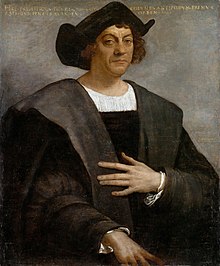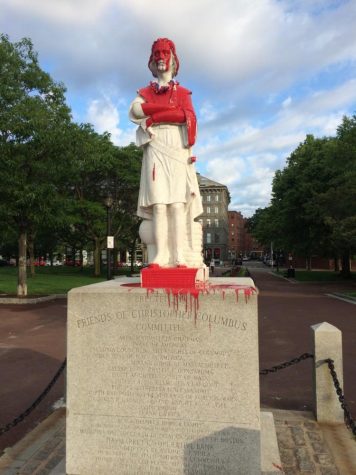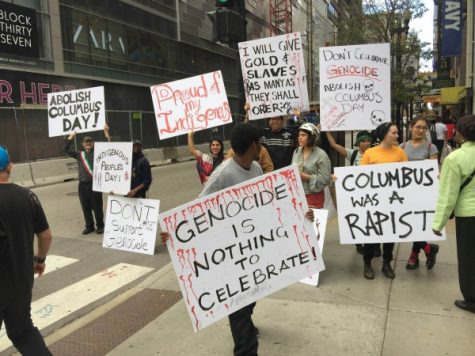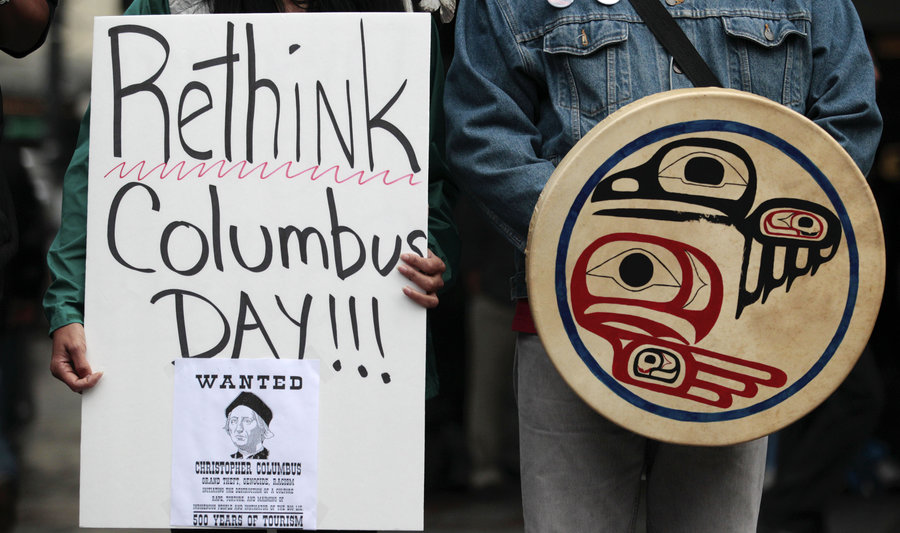Students Respond: Should Columbus Day Be Celebrated?
A sign held by a Native American protester publicly demonstrating against the celebration of Columbus Day in Seattle. Seattle later made the decision to replace the day with Indigenous Peoples’ Day in 2014.
October 8, 2017
Each and every year when summer comes to its abrupt close and students begrudgingly return back to their studies, students immediately begin counting down the days until the next extended break in the school year. More often than not, students do not even fully understand or care to understand the significance of the day they are receiving no school for, as long as there is no school.
For HHS students, that break comes in early October by way of a long weekend granted in honor of a day dubbed Columbus Day. Being a day of no school has made Columbus Day a much anticipated and even revered holiday to some. However, as students begin to learn the truth behind Columbus’s brutal, criminal acts and the manner of which he treated the Native populations of America, the morality of celebrating such a holiday comes into question: Is Columbus a man worth honoring?
“Columbus Day should not be celebrated. It was mass genocide against the Native American community. Columbus didn’t even discover America,” asserted junior Kate Falvey. “But I like the day off,” she added playfully.
From a young age, children are taught the classic nursery rhyme, “In fourteen hundred and ninety-two, Columbus sailed the ocean blue…” and told that Columbus “discovered” America. But as these children age, the sugar-coated tellings of Columbus are torn apart to reveal the truth: Columbus perpetrated violence and slavery against Native Americans, forced Native Americans to assimilate and convert to Christianity, assisted in introducing numerous diseases that decimated Native populations, ordered the killing of Native Americans who tried to fight back, and depicted the Native Americans as savage beasts when, in fact, he was the violent and inhumane one.

A posthumous portrait and arguably the most famous depiction of Christopher Columbus, painted by Sebastiano del Piombo in 1519. There are actually no known authentic portraits of Columbus.
Columbus and the men he brought with him proved to be murderers and rapists who inflicted unimaginable horror and pain upon undeserving Native Americans. Not to mention that he did not really discover America at all, on account of the fact that Native populations already lived there, he actually never set foot in North America (only islands in the Caribbean), and evidence supports that Norse sailors, including Leif Erikson, reached Canada 500 years prior to Columbus and that Phoenician sailors possibly crossed the Atlantic even earlier than that. All he truly did was introduce the Americas to Europeans, who, in turn, followed in Columbus’s cruel footsteps.
Knowing the dark truths of the voyages and actions of Columbus and his men brings cause to question whether or not the holiday should be celebrated at all.
Some HHS students, like junior Casey Hussey, feel angered by the fabricated, or even “white washed,” version of history they were exposed to growing up. Casey vented, “All I have to say is that Columbus Day skeeves me out because all throughout elementary school we were always like ‘YAY COLUMBUS, he’s awesome!’” she began. “And then, all of the sudden, we get to high school and all the teachers are like, ‘Surprise! He’s a rapist and was really bad towards the Natives!’ And it got me all confused and I still don’t get why elementary teachers allow or want to… praise him.”

In June of 2015, the group Black Lives Matter vandalized the Christopher Columbus statue that stands in Christopher Columbus Park on the waterfront in the North End of Boston in an act of protest. The red paint poured over the statue symbolically represents the bloodshed of Native Americans caused by Columbus. This is not the first or last time the statue has been defiantly defaced. These protests have received extremely mixed responses; some support them, others condemn them.
Many people like Casey also believe that the celebration of Columbus Day has a plethora of faults. Various protest groups have taken a stand in defiance of the celebration of the holiday and in support of a change. Some legislatures answered this call to action and decided to legally take the holiday and spin it so that it honors the Native Americans who were unrightfully harmed, robbed, and killed by Columbus instead of Columbus himself.
Back in 1977, the International Conference on Discrimination Against Indigenous Populations in the Americas began the discussion of transforming Columbus Day into Indigenous Peoples’ Day. In July 1990, in Quito, Ecuador, Native peoples representing Native groups throughout the Americas at the First Continental Conference on 500 Years of Indian Resistance decided to mark 1992, the 500th anniversary of the voyages of Columbus and his men, as a year to celebrate and promote the unification and liberty of the continents instead.
Soon after, in 1992, the Berkley City Council of California declared October 12 as a “Day of Solidarity with Indigenous People” and 1992 the “Year of Indigenous People,” symbolically renaming Columbus Day as “Indigenous Peoples’ Day” to express solidarity against the historical conquest and wrongdoings of Europeans against Natives. and to call attention to the losses suffered by Native Americans and their cultures. Starting in 1993, Berkeley extended its support of the change by beginning the tradition of holding an annual pow wow and festival on Indigenous Peoples’ Day.
In the years following this decision, numerous other cities throughout California such as Richmond, Santa Cruz, and Sebastopol, now celebrate Indigenous Peoples’ Day as well. As of today, at least four other states explicitly do not promote or celebrate Columbus or Columbus Day. These states, other than California, include South Dakota, Alaska, Hawaii, and Oregon. South Dakota officially celebrates Native American Day in place of it. Furthermore, various tribal governments in Oklahoma have taken it upon themselves to designate the day as “Native American Day,” or have renamed the day after their own tribes.
In October of 2014, Seattle, Washington, swapped Columbus Day for Indigenous Peoples’ Day. In June of 2016, the Cambridge City Council of Massachusetts voted unanimously to change Columbus Day to Indigenous Peoples’ Day. Many cities, towns, and universities throughout these states have begun to celebrate and recognize the event since then.
Quite recently, on August 30, 2017, right after votes in Oberlin, Ohio, and Bangor, Maine, from earlier in August reached the same verdict, the Los Angeles City Council voted in favor of replacing Columbus Day with Indigenous Peoples’ Day as well. Within the past week of October 2nd to October 6th, both the Austin City Council in Texas and Salt Lake City, Utah, voted to recognize Columbus Day no longer, agreeing to officially replace the holiday with Indigenous Peoples’ Day. Numerous other cities throughout America have also already made or moved to make the change.
Not all state legislatures approve of these decisions, however. Many state and city legislatures have made no strides towards changing of the holiday, regardless of whether or not protests have occurred.
Other states have even made the decisions to keep Columbus Day but designate another date entirely to the indigenous populations of America. According to the Chicago Tribune, in Illinois, Governor Bruce Rauner successfully passed an amendment to a pre-existing law on August 18th of this year. This law, called the State Commemorative Dates Act is to be amended as follows:
“The last Monday in September of each year is designated as Indigenous Peoples’ Day to be observed throughout the state as a day to recognize the contributions of indigenous peoples with suitable ceremony and fellowship designed to promote greater understanding and kinship between indigenous peoples and non-indigenous peoples of the state of Illinois.” However, this day is not recognized as a paid holiday for government workers, only as a commemorative observance.

A 2015 protest in Chicago against Columbus Day. This demonstration is one of many that have taken place throughout the U.S.
In light of all the controversy surrounding Columbus Day and the fact that HHS students have a day off from school in honor of it, many have strong opinions on the matter.
Senior Ethan Ayer certainly supports the movement to celebrate Indigenous Peoples’ Day. However, he recognizes the importance of continuing to learn about the history of Columbus, just in a factually correct manner. “I hope that people don’t forget about Columbus’ horrible actions and instead educate on them… so that, on Indigenous Peoples’ Day, [Native Americans] can celebrate,” he said.
Lucy Nash, a junior, continued on with this thought. “It’s often taught in schools that Columbus was a hero, and people tend to forget about the bad stuff that he did and the land that he took. Indigenous Peoples’ Day would be a good reminder of who was here before us,” she explained.
Junior Molly Schwall pondered her response for a few moments, weighing the difficulties of uprooting one holiday and establishing a new one with her knowledge of Columbus’ wrongdoings. Eventually, she decided, “I think that we should definitely have a day off. We need a break this time of year, and a no homework weekend is good to have. But I don’t think we should have it in honor of Columbus.”
When asked of his opinion, sophomore Sam Raphaelson decidedly deadpanned, “We shouldn’t celebrate a mass murderer.”
Overall, it appears that, while HHS students love having a break from their busy lives of school and extracurriculars, they also value historical accuracy. Not a single student out of the many quoted and spoken to had any positive remarks to give regarding Columbus and his actions, and each and every student supported the idea of Native Americans receiving better and well-deserved representation. However, both the opinions of students and legislature differ regarding how to carry this all out–either by way of replacing Columbus Day with Indigenous’ Peoples Day, leaving Columbus Day as is, or designating each holiday its own separate date.


































